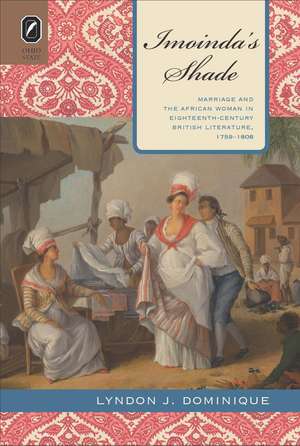Imoinda’s Shade: Marriage and the African Woman in Eighteenth-Century British Literature, 1759–1808
Autor Lyndon J. Dominiqueen Limba Engleză Paperback – 8 oct 2020
As the eighteenth century is entirely bereft of narratives written by African women, one might assume that these women had little to no impact on British literature and the national psyche of the period. Yet these kinds of assumptions are belied by the influence of one prominent African woman featured in the period’s literary texts.
Imoinda’s Shade examines the ways in which British writers utilize the most popular African female figure in eighteenth-century fiction and drama to foreground the African woman’s concerns and interests as well as those of a British nation grappling with the problems of slavery and abolition. Imoinda, the fictional phenomenon initially conceived by Aphra Behn and subsequently popularized by Thomas Southerne, has an influence that extends well beyond the Oroonoko novella and drama that established her as a formidable presence during the late Restoration period. This influence is palpably discerned in the characterizations of African women drawn up in novels and dramas written by late-eighteenth-century British writers. Through its examinations of the textual instances from 1759–1808 when Imoinda and her involvement in the Oroonoko marriage plot are being transformed and embellished for politicized ends, Imoinda’s Shade demonstrates how this period’s fictional African women were deliberately constructed by progressive eighteenth-century writers to popularize issues of rape, gynecological rebellion, and miscegenation. Moreover, it shows how these specific African female concerns influence British antislavery, abolitionist, and post-slavery discourse in heretofore unheralded, unusual, and sometimes radical ways.
Preț: 334.54 lei
Nou
Puncte Express: 502
Preț estimativ în valută:
64.01€ • 66.84$ • 52.98£
64.01€ • 66.84$ • 52.98£
Carte tipărită la comandă
Livrare economică 31 martie-07 aprilie
Preluare comenzi: 021 569.72.76
Specificații
ISBN-13: 9780814256251
ISBN-10: 0814256252
Pagini: 302
Dimensiuni: 152 x 229 x 23 mm
Greutate: 0.45 kg
Editura: Ohio State University Press
Colecția Ohio State University Press
ISBN-10: 0814256252
Pagini: 302
Dimensiuni: 152 x 229 x 23 mm
Greutate: 0.45 kg
Editura: Ohio State University Press
Colecția Ohio State University Press
Recenzii
“Imoinda’s Shade brings an extremely important message to readers, one that will force reevaluation of their conventional conceptions of the literature of the long eighteenth century as largely unconcerned with challenges and problems of racial difference, bias, and bigotry.” —Paul Youngquist, professor of English, University of Colorado, Boulder
“Lyndon J. Dominique’s in-depth study of Aphra Behn’s Oroonoko and a number of lesser-known works will add to the ongoing conversations about the abolition and emancipation eras in England, particularly in tracing the representations of African women on stage and in prose fiction. Dominique performs solid work.” —Candace Ward, associate professor of English, Florida State University
Notă biografică
Lyndon J. Dominique is assistant professor of English at Lehigh University.
Cuprins
Introduction Imoinda, Marriage, Slavery
Part One—Imoinda’s Original Shades: African Women in British Antislavery Literature
Chapter 1—Altering Oroonoko and Imoinda in Mid-Eighteenth-Century British Drama
Chapter 2—Amelioration, African Women, and The Soft, Strategic Voice of Paternal Tyranny in The Grateful Negro
Chapter 3—“Between the saints and the rebels”: Imoinda and the Resurrection of the Black African Heroine
Part Two—Imoinda’s Shade Extends: Abolition and Interracial Marriage in England
Chapter 4—Creoles, Closure, and Cubba’s Comedy of Pain: Abolition and the Politics of Homecoming in Eighteenth-Century British Farce
Chapter 5—“‘What!’ cried the delighted mulatto, ‘are we going to prosecu massa?’”: Adeline Mowbray’s Distinguished Complexion of Abolition
Chapter 6—“An unportioned girl of my complexion can . . . be a dangerous object.” Abolition and the Mulatto Heiress in England
Part One—Imoinda’s Original Shades: African Women in British Antislavery Literature
Chapter 1—Altering Oroonoko and Imoinda in Mid-Eighteenth-Century British Drama
Chapter 2—Amelioration, African Women, and The Soft, Strategic Voice of Paternal Tyranny in The Grateful Negro
Chapter 3—“Between the saints and the rebels”: Imoinda and the Resurrection of the Black African Heroine
Part Two—Imoinda’s Shade Extends: Abolition and Interracial Marriage in England
Chapter 4—Creoles, Closure, and Cubba’s Comedy of Pain: Abolition and the Politics of Homecoming in Eighteenth-Century British Farce
Chapter 5—“‘What!’ cried the delighted mulatto, ‘are we going to prosecu massa?’”: Adeline Mowbray’s Distinguished Complexion of Abolition
Chapter 6—“An unportioned girl of my complexion can . . . be a dangerous object.” Abolition and the Mulatto Heiress in England
Descriere
Demonstrates how fictional African women were deliberately constructed by progressive eighteenth-century writers to popularize issues of rape, gynecological rebellion, and miscegenation.
